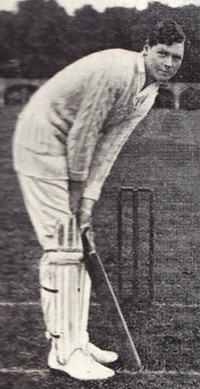Percy Chapman Cricketer
Arthur Percy Frank Chapman (3 September 1900 – 16 September 1961), usually known as Percy Chapman, was an English cricketer who captained the England cricket team between 1926 and 1930. A left-handed batsman, he played 26 Test matches for England, captaining the side in 17 of those games. Appointed for the final, decisive Test of the 1926 series against Australia, replacing Arthur Carr in controversial circumstances, Chapman won the match so that England won The Ashes for the first time since 1912. An amateur cricketer, Chapman played Minor Counties cricket for Berkshire and first-class cricket for Cambridge University and Kent. He is one of only two men to score centuries in the three most prestigious matches played at Lord's Cricket Ground; in the University Match between Oxford and Cambridge, in the Gentlemen v Players game, and in a Test match. Born in Reading, Berkshire and educated at Uppingham School, Chapman established a reputation as a talented school cricketer and was named one of Wisden's schoolboy Cricketers of the Year in 1919. He went to Pembroke College, Cambridge and represented the University cricket team with great success; his fame reached a peak when he scored centuries against Cambridge University and in the Gentlemen v Players match, both highly prestigious games, within the space of a week. Selected twice to tour Australia, with the Marylebone Cricket Club (MCC) teams in 1922–23 and 1924–25, Chapman made his Test debut on the latter tour, although he had yet to play County Cricket. Having qualified for Kent, he was the surprise choice to take over from Carr in 1926, but went on to win his first nine matches in charge, setting a Test match record which still stands in 2012, but lost two and drew six of his remaining games. Perceived tactical deficiencies and possibly growing concerns over his heavy drinking contributed to Chapman's controversial removal from the team in 1930. Subsequently, his batting began to fade. Although he assumed the Kent captaincy in 1931, earning the acclaim of team-mates and critics, his career gradually declined until he resigned the position in 1936 and his career ended in 1939. By then, he was very overweight, in contrast to the athleticism of his earlier career, and was drinking very heavily. Chapman was never a reliable batsman but had a respectable batting record. In Tests, he scored 925 runs at an average of 28.90 and in first-class cricket accumulated 16,309 runs at an average of 31.97. He could score runs very quickly and spectators found his batting enjoyable to watch, but his ability declined as his weight increased. As a fielder, contemporaries rated him one of the best of all time and he was capable of catches regarded as exceptional. Opinions were divided on his tactical ability as a captain but most critics believed he was an inspirational leader. Chapman's fame as a cricketer made him a popular public figure; he and his wife, whom he married in 1925, were well known figures in fashionable society. Their appearances were followed closely in the press. Outside of cricket, Chapman worked for a brewery, which possibly contributed to his later alcoholism. In his later years, Chapman increasingly suffered from the effects of heavy drinking and was often seen drunk in public. He and his wife divorced in 1942 and Chapman spent his final years, mainly alone, suffering from depression, arthritis and his continued dependence on alcohol. Following a fall at his home and a subsequent operation, Chapman died in 1961, aged 61.
